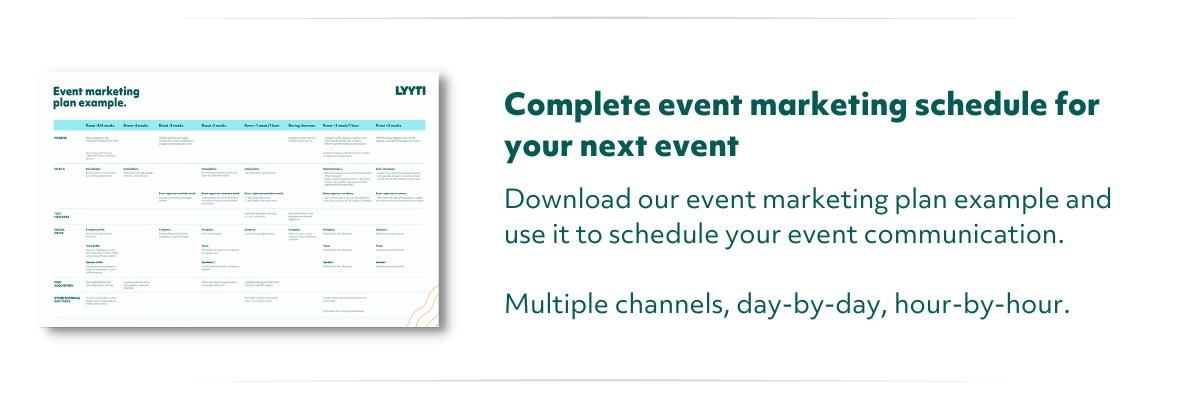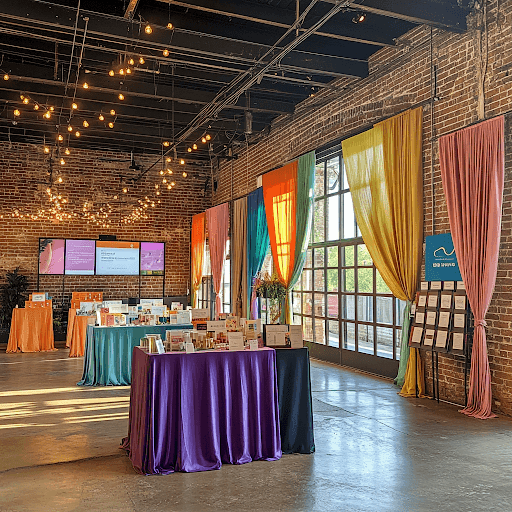Event marketing is a critical component of any successful event, and requires careful planning, execution, and analysis to ensure its effectiveness. As seasoned event organisers, you likely already understand the importance of event marketing in generating buzz, driving attendance, and ultimately achieving your event goals.
However, in today's crowded and competitive event landscape, it's more important than ever to identify the most effective event marketing efforts that can help you stand out and achieve your desired outcomes.
Effective event marketing is not just about promoting your event to the masses; it's about creating a targeted and strategic approach that engages your audience, communicates your event’s value, and ultimately drives action.
This requires a deep understanding of your ideal audience, their needs and preferences, and the channels and tactics that resonate with them most. By investing in the right event marketing efforts, you can maximise your ROI and enhance the attendee experience.
In this blog, we'll explore some of the most effective event marketing efforts that can help you run a successful event, from pre-event promotions to during-event engagement to post-event follow-up. Whether you're looking to boost attendance, increase sponsorship revenue, or establish your event as a thought leader in your industry, the strategies we'll cover can help you achieve your goals and drive success.
Pre-event marketing efforts
- Creating a strong event brand
- Leveraging social media and email marketing
- Partnering with influencers or industry leaders
- Offering early bird discounts or exclusive perks
- Hosting pre-event contests or giveaways
During-event marketing efforts
- Engaging participants through interactive experiences
- Encouraging social media sharing and hashtags
- Utilising event signage and branding
- Collecting attendee data for future marketing efforts
Post-event marketing efforts
- Following up with participants through email or surveys
- Sharing event highlights and key takeaways on social media
- Offering post-event promotions or discounts
- Utilising attendee testimonials or feedback for future marketing efforts
Let’s dive into the specific marketing initiatives of an event’s lifecycle, which can be divided into three main stages - pre-event, during-event and post-event. Each event stage has its own set of marketing efforts you can focus on to activate your audience.
Pre-event marketing efforts that promote your event
The event lifecycle is multidimensional - to say the least. There are multiple opportunities to connect with your intended audience to encourage registration, reduce no-show, and drive engagement.
Pre-event marketing efforts are all about creating buzz, generating interest, and making sure you have the right names on the participant list.
You want to focus on channels and networks that you own but consider having a marketing budget for pre-event activities to broaden your reach.
- Creating a strong event brand: Establishing a consistent and recognisable brand identity across all your marketing materials can help create a sense of anticipation and excitement for your event. This unified look and feel will increase your event's professionalism and build trustworthiness.
- Leveraging social media and email marketing: Utilising social media platforms like Instagram, Facebook, and LinkedIn, as well as email marketing campaigns, can help you reach your target audience and build a community around your event. Create event specific hashtags that you can use throughout your event.
- Partnering with influencers or industry leaders: Collaborating with influential individuals in your industry can help you reach a wider audience and establish your event as a must-attend occasion. Take this into account already when you plan your event. If you’ll have keynote speakers, consider who has the right kind of network to leverage.
- Offering early bird discounts or exclusive perks: Providing incentives for attendees to register early or purchase premium tickets can help drive early registrations and generate revenue.
- Hosting pre-event contests or giveaways: Creating buzz and excitement through contests or giveaways can help create a sense of playfulness and drive interest in your event.
By implementing these pre-event marketing efforts, you can create a strong foundation for your event's success and ensure that your target audience is aware of your event and excited to attend.
During-event marketing efforts that engage your audience
During-event marketing efforts are crucial for keeping attendees engaged, promoting your event, and creating a memorable experience in real-time.
Make sure you have a communications plan and a way to keep participants informed about what is happening at the event. At a large event, it’s a good idea to send emails or even SMS messages. If your event is on the smaller side, the host should have a clear sense of the schedule - and a loud voice or a mic to give instructions and reminders.
-
Engaging attendees through interactive experiences: Providing interactive experiences such as games, contests, or photo booths and walls can help attendees feel more connected to your event and encourage social sharing.
-
Encouraging social media sharing and hashtags: Remember that hashtag you created before? Let participants use it now to share their experience on social media. Your participants will promote your event to an even wider audience and create content from the event for you.
-
Utilising event signage and branding: Utilising consistent and visually appealing branding and signage can help attendees easily navigate your event and reinforce your event's key messaging. If your event is in-person, use the venue in different ways to make the event experience stick. Think about decorations, spaces for networking opportunities and branded refreshments.
-
Collecting attendee data for future marketing efforts: Collecting data on attendee demographics, interests, and behaviour can help you tailor your future marketing efforts and better understand your target audience.
During-event marketing efforts should be designed to enhance the attendee experience, drive engagement, and promote your event's key messages. By utilising these tactics, you can create a more memorable and impactful event that resonates with attendees and drives post-event engagement.
Post-event marketing efforts to follow up and improve your event game
Post-event marketing efforts keep the momentum going. These activities nurture relationships with attendees, and create opportunities for future engagement.
After your event you’ll have distinct audiences who will benefit from different kinds of information. Event attendees, no-shows, staff working to make your event happen and people unrelated to the event are such audiences.
Benefit from the wealth of information you’ve collected during the event whether it be content, data or even a set of questions and use it to build lasting relationships and to improve your future events.
- Following up with attendees through email or surveys: Sending personalised thank-you notes or surveys to attendees can help you gather feedback and insights that can inform your future marketing efforts.
- Sharing event highlights and key takeaways on social media: Sharing highlights and key takeaways from your event on social media can help you continue to engage attendees, grow your fan base and promote your brand to new audiences.
- Offering post-event promotions or discounts: Offering post-event promotions or discounts can incentivise attendees to continue engaging with your brand and drive future sales or registrations.
- Utilising attendee testimonials or feedback for future marketing efforts: Incorporating attendee testimonials or feedback into your marketing materials can help establish your event as a trusted industry destination and encourage future attendance.
By implementing these post-event marketing efforts you can maintain the momentum of the event, build lasting relationships with attendees, and lay the foundation for future success.
Simple timeline, assets and messaging prompts for event communications
Here's a sample schedule for event marketing for an online webinar that will take place in two months time, along with some simple message examples:
8 Weeks Out
- Establish your event brand and messaging.
- Create a landing page for the event or on your website a dedicated event site.
- Start promoting the event on social media using a unique event hashtag.
- Send a "Save the Date" email to your email list with a brief description of the event and a link to the landing page.
Example Message:
"Mark your calendar! Join us in two months for our upcoming online webinar on [Topic]. Stay tuned for more details and registration information."
6 Weeks Out
Start promoting the event through paid advertising campaigns, such as Facebook or Google Ads.
- Reach out to industry influencers or partners to promote the event and potentially offer special promotions.
- Consider offering early bird discounts or special perks to encourage early registrations.
- Continue to promote the event on social media and through email marketing.
Example Message:
"Don't miss out on our upcoming online webinar! Register now and receive an exclusive discount on your ticket price."
4 Weeks Out:
- Send a reminder email to your email list, including a more detailed description of the event and speaker information. It’s important to change the content of your message every time you send out something.
- Host a pre-event contest or giveaway on social media to generate buzz.
- Consider creating a promotional video for the event and sharing it on social media or the landing page.
- Utilise event signage and branding materials to promote the event at other relevant industry events or conferences.
Example Message:
"Only four weeks until our online webinar! Get ready to learn from industry experts on [Topic] and network with other professionals. Don't forget to register today!"
2 Weeks Out
- Send a final reminder email to your email list with all necessary event information, such as date, time, and login instructions.
- Continue to promote the event on social media, highlighting speaker or session details.
- Encourage attendees to share their excitement on social media using the event hashtag.
- Consider offering a special promotion or giveaway during the event to encourage engagement.
Example Message:
"Are you ready for our online webinar next week? Brush up on your skills and hear from our expert panel on [Topic]. Register now and join us for an interactive and informative event!"
Event Day:
- Send a final reminder email to registered attendees with login instructions.
- Promote the event in real-time on social media, sharing quotes or key takeaways from speakers.
- Utilise event signage and branding materials during the webinar to reinforce key messaging.
- Consider hosting interactive experiences during the webinar, such as polls or Q&A sessions, to encourage engagement.
Example Message:
"The day is finally here! Log in now to join us for our online webinar on [Topic]. Engage with industry leaders and learn valuable insights to take your skills to the next level."
Post-Event:
- Send a personalised thank-you email to attendees, including a link to the webinar recording and any relevant follow-up information.
- Share highlights or key takeaways from the event on social media and your website.
- Offer a special promotion or discount to attendees for future events or products.
- Collect attendee feedback through surveys or testimonials to inform future marketing efforts.
Example Message:
"Thank you for attending our online webinar! We hope you found it informative and valuable. Access the recording and stay tuned for future events and promotions. Don't forget to share your feedback with us through our survey."
Conclusion
In conclusion, event marketing is a crucial aspect of any successful event. By implementing effective pre-, during-, and post-event marketing efforts, event organisers can maximise attendance, engagement, and ROI.
Pre-event marketing efforts are focused on generating excitement and awareness for the event, with a key emphasis on early-bird registration, promotional offers, and social media outreach.
During-event marketing efforts aim to engage attendees and create a memorable experience, with an emphasis on interactive elements, event branding, and real-time social media promotion.
Post-event marketing efforts are essential for extending the event's impact, with a focus on follow-up communications, social media sharing, and attendee feedback collection.
It's important to note that event marketing strategies will vary depending on the type of event, target audience, and industry. Check out the blog B2B event marketing ideas for creative options to make your events shine.
Overall, successful event marketing requires a comprehensive and integrated approach, including clear messaging, engaging content, and a range of marketing channels. With the right strategies and tools, you can create a powerful and memorable event that generates buzz and drives results.
If you want to know even more about event marketing and need help designing event assets, then download the Event Marketing Playbook below.











